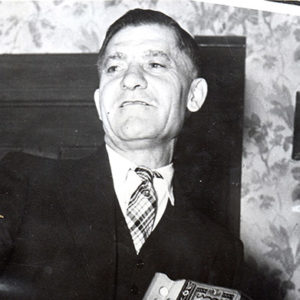calsfoundation@cals.org
Kessler v. Strecker
Kessler v. Strecker was a U.S. Supreme Court case in 1939 concerning the arrest and planned deportation of Joseph George (a.k.a. Josef or Joe Georg) Strecker, a Hot Springs (Garland County) restaurant owner, for alleged membership in the Communist Party. This case happened around the time Texas congressman Martin Dies was publicly demanding the deportation of International Longshoremen’s Association head Harry Bridges for similar reasons. When Secretary of Labor Frances Perkins refused to act on Bridges’s case until Strecker’s case was settled, Republicans began impeachment proceedings against her.
Born on August 29, 1888, in Galicia, then a part of Austria-Hungary, Strecker immigrated to the United States in 1912 and worked in coal mines before settling in Hot Springs, running a café at times. Although a non-citizen, Strecker had voted in the 1928 and 1932 presidential elections. “Here in Hot Springs we are broadminded on a question like that,” his lawyer later declared.
His troubles began when, following a speech by William Zebulon Foster, a three-time (1924, 1928, 1932) Communist Party presidential candidate, he donated sixty cents to the party. He paid no further dues. A second version of the story states that a speaker he observed on the streets of Hot Springs prompted him to donate the small amount. After applying for citizenship, he was arrested in November 1933 and, after two intimidating hearings, was ordered deported. Hot Springs lawyer Calvin Alpheus Stanfield, known as the “Clarence Darrow of Arkansas,” petitioned for a writ of habeas corpus. The case, as Strecker v. Kessler, District Director of Immigration and Naturalization, went to the Circuit Court of Appeals, Fifth Circuit in New Orleans, Louisiana, in 1939.
The presiding judge, noted legal theorist Joseph Chappell Hutcheson Jr., described Strecker as “a small bourgeoisie, a merchant, with little capital, some canniness, a fair amount of human kindness, some bad habits, and apparently no quarrel with the government of the United States.” Hutcheson observed that the government was relying on laws passed during Red Scare and that it was “a kind of Pecksniffian righteousness, savoring strongly of hypocrisy and party bigotry” to claim that Strecker was a danger to the country.
The government appealed the decision to the Supreme Court. Strecker’s counsel now included Whitney North Seymour, a leading civil rights lawyer and a former assistant solicitor general. Joining Stanfield and Seymour on the brief were Carol Weiss King, who was a leading immigration lawyer, and Herbert T. Wechsler, a famous Columbia University law professor. These three had just won acquittal for Angelo Herndon, who had been charged with possessing communist literature in Georgia, a case that involved young Arkansan C. Vann Woodward.
The government’s central argument was that mere membership at any time since or even before the passage of the Red Scare laws in 1918 and 1919 was sufficient to justify deportation. However, a decision written by Justice Owen Josephus Roberts construed the laws as lacking “a clear and definite expression.” Strecker was discharged from custody. Justices James Clark McReynolds and Pierce Butler, two of the arch conservatives on the court, dissented. McReynolds found there was a “clear and positive expression of Congressional intent” and that it did not matter if the membership was for “a day, a month or a year before his arrest.”
After the Strecker decision, the standard for deporting International Longshoremen’s Association head Harry Bridges became to prove that he was a member of the Communist Party on March 2, 1938, the date on which he had been arrested. Perkins appointed James M. Landis, the dean of the Harvard Law School, who concluded that Bridges was only “energetically radical.”
Both Strecker and Bridges were only briefly free. Conservatives in Congress proceeded to provide new language, and on January 7, 1941, Strecker was arrested and taken immediately to New Orleans, only to be freed on February 5. The deportation hearing was to be held in Hot Springs sometime in the future. In reality, Poland earlier had refused to receive him, and in 1941 the national government existed only in exile. The following year, Joseph George Strecker of 110 Ravine Street, Hot Springs, registered for the draft.
During this time, Strecker divorced his wife first in Poland, married again, and divorced again. In 1938, the Hot Springs City Directory showed him running the Family Circle Café at 303 Malvern Avenue. After 1946, there are no further entries on Strecker in Arkansas. The location and date of his death have not been definitively determined, although a family member reported that he moved to Arizona and died on January 17, 1952.
Robert H. Jackson, the solicitor general, claimed that Strecker was really a Trojan Horse for communism; in reality, it was the case and not Strecker that fit that definition, as the Strecker case demonstrates how seemingly insignificant cases may hide in matters of great moment. More forward looking was Stanfield’s argument that the First Amendment protected aliens and citizens alike. The decision continues to be cited in cases involving undocumented migrants.
For additional information:
“Asks High Court to Oust Strecker.” New York Times, February 11, 1939.
Kessler, District Director of Immigration and Naturalization, v. Strecker, 307 U.S. 22, 59 S.Ct. 694, 83 L.Ed. 1082 (1939). https://supreme.justia.com/cases/federal/us/307/22/ (accessed October 14, 2020).
“Hearing of Red Charge.” Arkansas Gazette, April 22, 1939, p. 4
Martin, George Whitney. Madam Secretary: Frances Perkins. Boston: Houghton Mifflin Co., 1976.
“Redbug-on-a-Slide.” Time, February 20, 1939, pp. 14–15.
Michael B. Dougan
Jonesboro, Arkansas
 Early Twentieth Century, 1901 through 1940
Early Twentieth Century, 1901 through 1940 Law
Law Josef Strecker
Josef Strecker 




Comments
No comments on this entry yet.